Mediterranean Diet Inspired Products at the World’s Largest Food and Nutrition Conference-FNCE
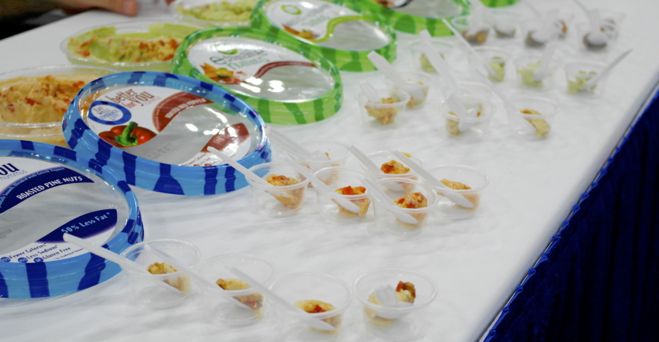
Once again I attended the Food and Nutrition Conference and Expo organized by the Academy of Nutrition and Dietetics (former American Dietetic Association). This is the world’s largest food and nutrition conference with 8000 attendees mostly Registered Dietitians and other nutrition professionals. Currently living in Greece, this conference is important for me as I can see nutrition trends in the U.S., but also see if and how the Mediterranean diet or parts of it are communicated to American nutrition professionals.
The conference is composed of various educational sessions as well as the exposition. Attendees have the opportunity to attend a variety of sessions based on their specialty or interests: international, clinical nutrition, culinary, public policy etc. I attended several sessions and some that are related to the Mediterranean diet. Although I did not clearly see any session that was devoted to the Mediterranean diet, which to be honest I thought there would be, considering all the attention the Predimed Study received (Spanish study that showed that a Mediterranean diet may be more protective than a low fat diet). There was a session though that did discuss the study but in the context of unsaturated fats. There were two other sessions that discussed healthy fats and mentioned the Mediterranean diet, but yet almost no mention of olive oil was made and two of the sessions presented research on corn and canola oil.
Now I’m not trying to find fault, but really, how can you mention the Mediterranean diet and healthy fats and not discuss olive oil? I can’t put my finger on it, it’s like olive oil is being ignored in some way. I know there are various interests, but I do think nutrition professionals need to know a bit more, rather than being bombarded by information on every single cooking oil on the market-except olive oil. In any case I wrote about these sessions in detail in an article in Olive Oil Times.
At the expo, I’ll usually wander to the back where I can find the Natural and Organic sections. The expo nowadays seems to include more and more companies that really are irrelevant for nutrition professionals who want to help the public eat healthy and naturally such as Monsanto, DuPont, soda companies etc. etc.
Unfortunately there was not much presence of olive oil at the expo. Last year there were several booths and I was hopeful that this year there would be even more. But that was not the case. Only the North American Olive Oil Association had a booth, and while it was in a prime position at the expo hall, it only had a few pamphlets to offer and nothing else, too bad a missed opportunity.
Mediterranean Inspired Food Products
At the expo there were some good products out there that can help someone make their diet a bit more Mediterranean. There were several Greek yogurt booths present, and of course Chobani had a large booth handing out their yogurts. Unfortunately, FAGE (the company that in essence brought and coined the term “Greek yogurt”) was once again absent, I was disappointed that they were not at the expo this year too.. I really cannot understand that move, considering that they are really losing the “yogurt wars”.
Other booths included the Better Bean Company that offers fresh bean mixes in BPA free packages. These blends include beans, spices, herbs, vinegar and ingredients such as onions and peppers without any preservatives or additives. They use safflower oil, but they should have some olive oil blends as well, olive oil and beans tastewise is a perfect combination. In any case, this is an easy way to get beans in your diet if you do not have time to cook.
Another interesting product is the Other Bean Hummus, which is basically hummus made with a variety of beans (other than the traditional chickpea), there were some interesting flavors such as Spicy and Yellow Lentil hummus with sunflower seeds and apricot. With the basis being beans and oil (they use a combo of canola and olive oil), this is a healthy dip even if not exactly traditional.
The California Walnut Commission, always active at this expo, is really positioning their organization as a Mediterranean Diet Resource. They have some nice pamphlets as well as recipe collections, and I have used several. They did donate the walnuts for the Predimed Study and at least one researcher related to the study has worked as consultant for them. And while there is no doubt that walnuts are healthy, it needs to be said (I have mentioned before here) that nuts were not a daily habit in the traditional Mediterranean diet (which was based on the diet of Crete, Greece and southern Italy). We therefore need to be careful with the consumer messages, as it seems sometimes that they are saying a Mediterranean diet can include either walnuts OR olive oil, which is not the case, based on scientific data. Both yes, but a Mediterranean diet without olive oil, is not a Mediterranean diet.
Mediterranean Snacks is a company I had seen last year; they basically make chip type snacks made from beans. I had tried their baked lentil chips and crackers, which were not bad, if you really need a ready-made snack. I would stick though to the Lentil chips which do not contain any palm oil. This year they came out with Tapaz To Go, which is a mini meal that includes hummus and their lentil crackers, I thought is a nice alternative to the Lunchables line, as you are getting some good plant protein and fiber from the hummus.
Another interesting chip company was the Food Should Taste Good Company. They have tortilla chips and other chips that are made with natural products, non-GMO with some unique flavors. Not necessarily less calories than the normal tortilla chips, though. One of the reasons I stopped by was because they had olive tortilla chips, which had kalamata olives in them; again no olive oil is used, although they would taste even better.
I stopped by the company Bella Sun Luci, a company that was present at FNCE last year, they have yummy sun-dried tomatoes with different herbs, olive oil and tomato sauce. Up till now I thought that these products were Italian, based on the name, and on the website as they have a map of Sicily on the background. But all the products are from California, which is fine, and California has wonderful products, it just seems a bit misleading to use an Italian name.
Cut n Clean Greens, was another company that caught my attention, they basically had washed and packaged greens. They carry all sorts of varieties and mixes such as collard, mustard and turnip greens. These are great, and you can prepare them Greek style, boiling them gently and then adding a bit of olive oil, lemon and feta cheese or in a pita (savory pie), and of course in salads. Now this is a product that help you eat better without depending on highly processed products.
One more company that stood out, not because they had some sort of new product, but because their booth was probably the healthiest at the expo, an oasis of healthy simple food among the desert of all the packaged stuff. The company is known as Carmelina Brands and they basically sell canned San Marzano tomatoes and several bean varieties without any chemical additives. They had a nice spread with beans and tomatoes and it made me think that sometimes fresh and wholesome real food is all you need to make people eat better, rather than highly processed products with added vitamins, minerals, protein fiber and whatever else they can think of.
All in all my impression is that there is a lot of discussion about the Mediterranean diet especially because of the Predimed study earlier in the year, and anything labeled as “Mediterranean” is instantly considered healthy or healthier. And while many products may have a Mediterranean element to them, some are not really healthy at all and would not belong in a real Mediterranean diet. In the end it is all about fresh, in season, minimally processed food.
Registered Dietitians and Nutritionists need the tools to teach, encourage and provide the public with simple, affordable and accessible ways to eat healthy rather than depending on convenience products that are not necessarily beneficial, but also never teach you how to make and eat healthy food on your own.

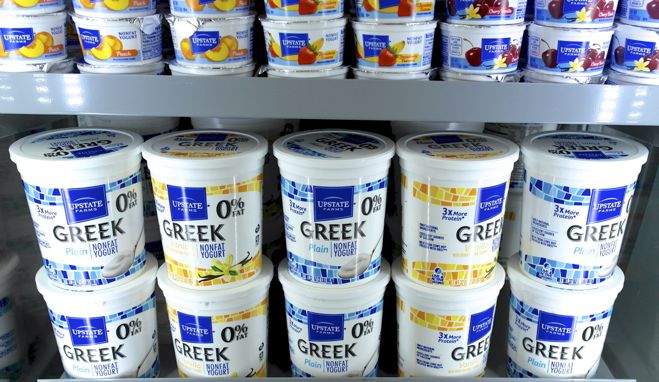
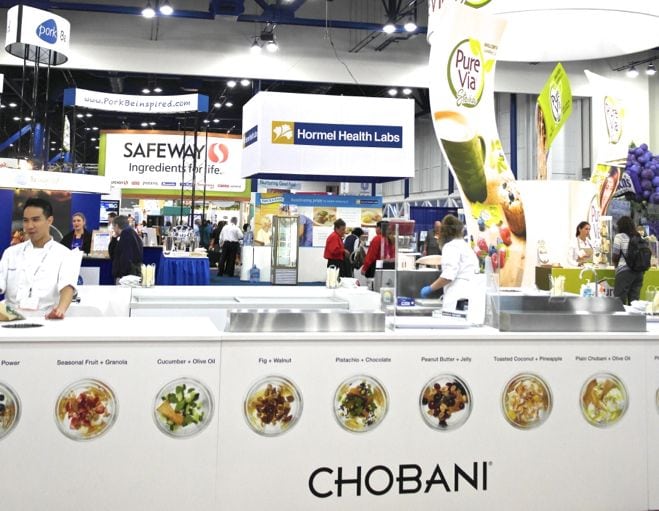

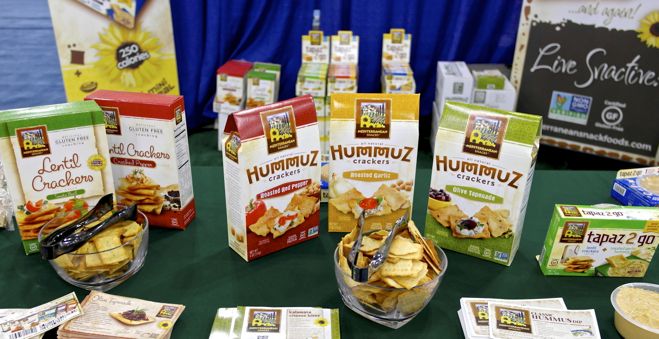
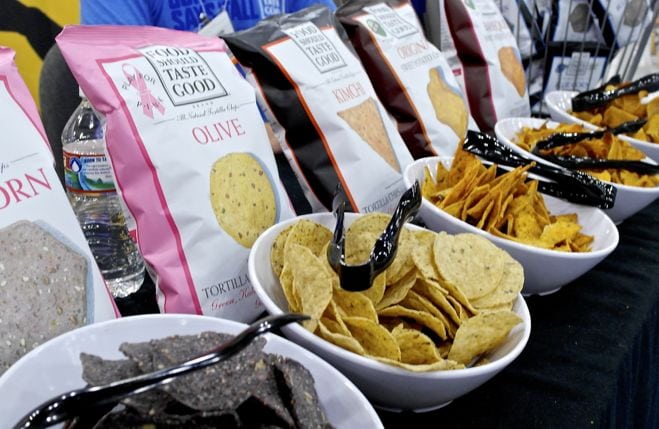
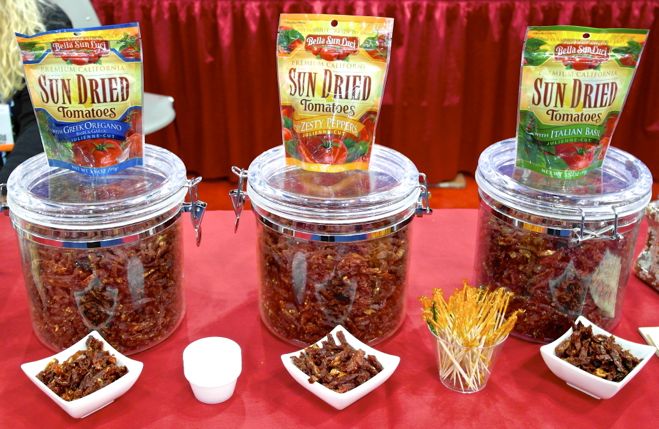
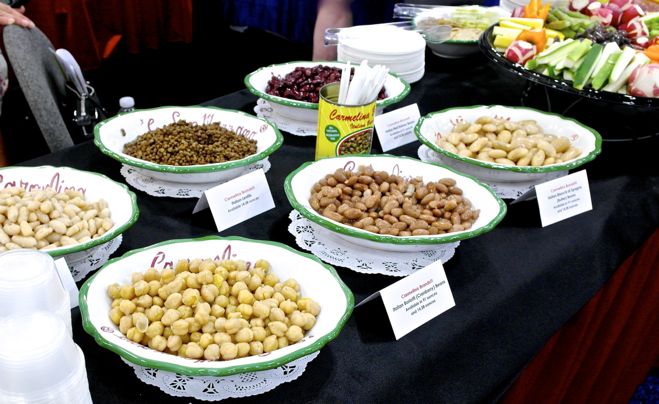
Elena:
Thank you for highlighting a glaring problem with the relationship with BIG Food and health. I too continue to look for ways to promote a healthy Med Diet amongst the difficult chatter of processed foods.
And thanks for highlighting the possibilities at the FNCE, we have to keep our eyes open for affordable, excellent products for heart health.
Thank you Mindy! YEs, sometimes you really need to search the expo to find normal food, I guess there is the impression that fresh food does not need that much promoting.
Thank you for your article. Very thorough. Maybe a Mediterranean Diet booth featuring appropriate companies in one place.
Thanks Karen! That is such a great idea.
Thanks for posting your tour and insights. I too am disappointed to read that the obvious benefit of the Mediterranean Diet is being overlooked. I can not understand missing the big simple answer to a healthier world…….Politics?
Thank you Brenda. I believe it is a combination of reasons, and definitely politics.
Politics and greed. I was going to say profit, though of course producers have to make a profit and every right to do so if they produce something healthful. But what’s with the 0% Greek yogurt? What I buy is ewe’s or goat’s milk, and definitely not 0%. (I had a very serious cow milk allergy as a child).
I’ll read up on Predimed, but much as the Spanish diet has all the requisite healthy Mediterranean foods (and also fish from the Atlantic side), there is a great deal of bits of meat (especially pork) in so many dishes; this is a legacy from the Reconquista, when Spaniards had to prove they weren’t Jews or Muslims. Especially in contemporary times, but that can also be a problem with Greek or southern Italian food
I love your conclusion about we just need to help people cook healthy and flavorful foods. Thanks Elena!
Thank you Malena!